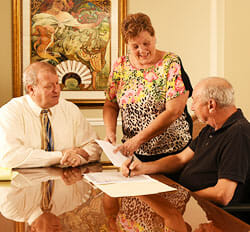Sexual Abuse in Maryland Nursing Homes
Nursing Home residents have a variety of health problems which make them susceptible to sexual abuse. They are often weak and defenseless and become easy prey for sexual predators. Conditions such as dementia, Alzheimer’s, speech problems, and mobility problems often prevent them not only from fending off molestation or rape, but also from reporting the crime. Additionally, they may fear that further physical or sexual abuse may continue if the action is reported or if they are not believed.
That means any unwanted or inappropriate touching to breasts or genitals or forcing or tricking the victim to engage in sexually inappropriate behavior with the perpetrator. Rape, sodomy, oral sex, and photographing are some examples. If the resident is too ill or mentally incapacitated, then they are considered unable to give consent. Sexual abuse can be by a nursing home staff member, another resident, a stranger or even a family member.
Sexual Abuse by a Nursing Home Staff Member
This is the most common type of abuse. Nursing homes are required to conduct criminal background checks of potential employees, but often they fail to. This may expose the facility to liability. The aides are responsible for bathing, dressing, taking residents to the bathroom, incontinent care, feeding and other activities of daily living. This creates the opportunity for sexual abuse. Liability is obviously against the perpetrator, but also is against the facility, since the facility allowed the abuse to occur and the staff member was acting within the scope of their employment. The failure to supervise employees will also subject the facility to liability. These failures may be due to understaffing or poor training. All such incidents need to be promptly reported to the police and other agencies such as Adult Protective Services. Emergency medical attention should be sought for the victim.
Sexual Abuse by Another Resident
Most nursing homes have male and female residents on the same floor. These settings often will cause resident-on-resident physical or sexual abuse. Rarely are these situations consensual, especially if the parties have diminished mental capacity due to a brain injury, disease or some type of dementia. It is the facility’s obligation to make sure all residents are safe. If there is a minor incident, the perpetrator or victim should be moved to another floor and the situation closely monitored. If there is a more serious sexual assault, the police and Adult Protective Services should be called and the assault reported and medical attention obtained.
Sexual Assault by Strangers
Although it is rarer, sometimes strangers enter a nursing home without detection. This is an issue of negligent security, and the facility can be held liable if physical or sexual abuse occurs.
Sexual Assault by Family Members
This type of assault is rare, and usually unreported, but a husband cannot rape or force his wife to have sex if it is non-consensual. This typically occurs when the wife has diminished mental capacity. Other family members may also sexually abuse the resident. To prove liability on the part of the facility, usually it is necessary to show that the facility had some type of notice of the abuse and failed to take steps to prevent it.
Signs of Sexual Abuse
The following list may indicate some signs that your loved one has been sexually abused:
- Bruising or handprints on or around the genitals, thighs, breasts, buttocks, etc.
- Unexplained vaginal, penal, or anal bleeding
- Unexplained difficulty sitting, moving or walking
- A sexually transmitted disease or infection
- Seminal fluid in or around the vagina or anus
- Torn, bloody or stained clothing
- Stained or bloody sheets
- Impressions on the arms, wrists or ankles, where they may have been restrained
- Changes in demeanor, communication, withdrawal, fear, etc.
What should be done. If you suspect that a loved one has been physically or sexually abused, promptly notify the facility administrator and police. Emergency medical attention should be obtained.
Is there a claim against the nursing home?
 Nursing homes are required by State and Federal law to keep their residents safe and free of abuse and neglect. If they fail to do so, a claim may be filed for the resulting damages to the victim. If the assault causes death, then other family members can also bring an action. See the Wrongful Death page on this website for more information.
Nursing homes are required by State and Federal law to keep their residents safe and free of abuse and neglect. If they fail to do so, a claim may be filed for the resulting damages to the victim. If the assault causes death, then other family members can also bring an action. See the Wrongful Death page on this website for more information.
The Law Offices of Roger S. Weinberg, LLC has successfully handled cases of sexual abuse and neglect at long-term care facilities, such as nursing homes. We will passionately investigate and litigate your case to get the compensation and justice you deserve.


 Roger Weinberg is a skilled and experienced attorney who has pioneered the legal field of representing Nursing Home, Assisted Living, and Developmental Disability victims and their families who have experienced abuse, neglect and wrongful death. He is a leader in this field and teaches other lawyers, students and medical personnel about the laws impacting such cases. [
Roger Weinberg is a skilled and experienced attorney who has pioneered the legal field of representing Nursing Home, Assisted Living, and Developmental Disability victims and their families who have experienced abuse, neglect and wrongful death. He is a leader in this field and teaches other lawyers, students and medical personnel about the laws impacting such cases. [ 



